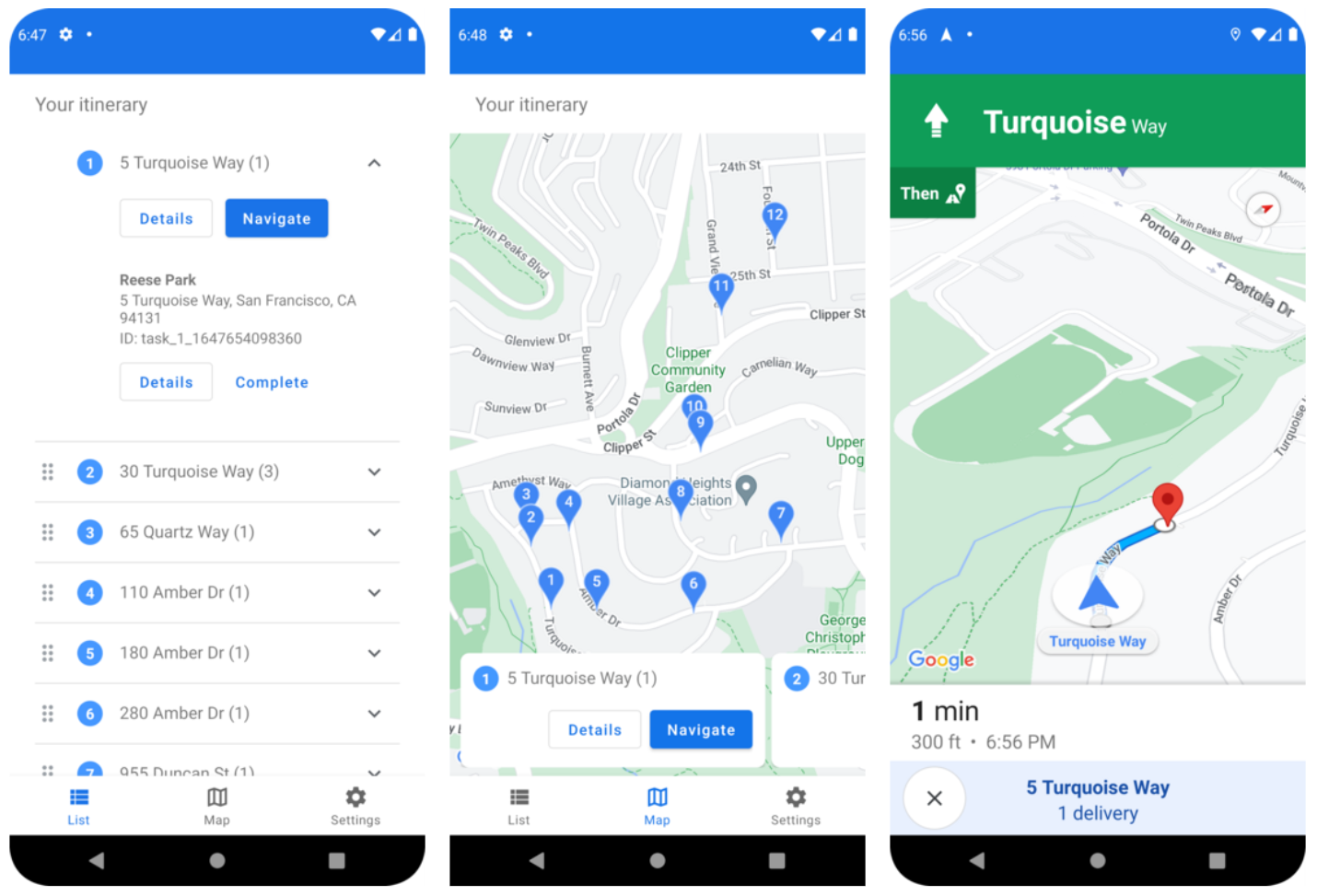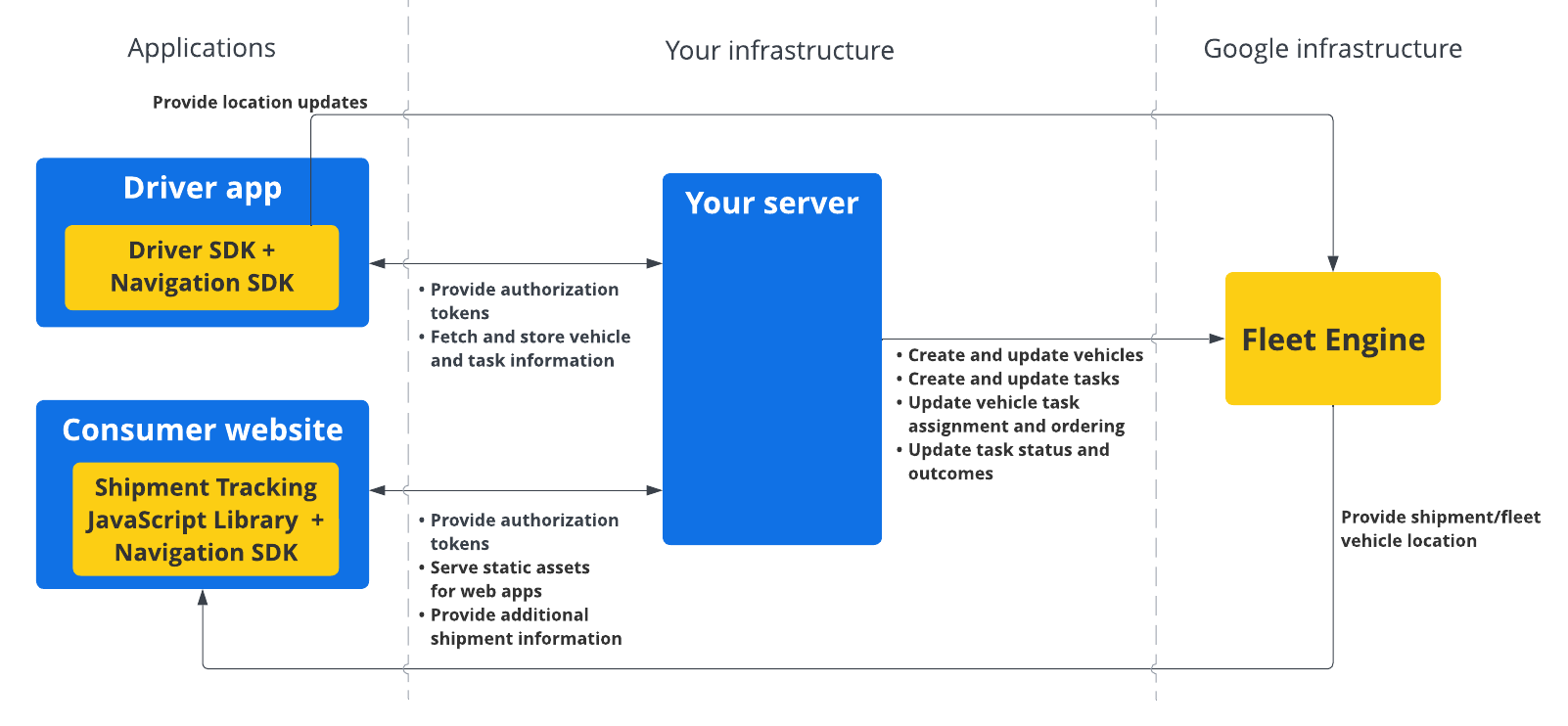
Driver SDK là một bộ công cụ ứng dụng di động và là một thành phần cơ bản của Fleet Engine. Với SDK này, ứng dụng dành cho người lái xe của bạn có thể quản lý việc giao việc và cho phép các chức năng chỉ đường và định tuyến cho người lái xe.
Trước khi bắt đầu
Hướng dẫn này giả định rằng bạn đã đọc những nội dung sau:
- Những điều cơ bản về Fleet Engine.
- Mô hình dữ liệu cho xe.
- Mô hình dữ liệu cho các việc cần làm định kỳ.
- Cách thiết lập Fleet Engine.
- Cách tạo và sử dụng xe trong Fleet Engine.
Driver SDK dành cho các tác vụ định kỳ là gì?
Driver SDK truyền đạt thông tin cập nhật về vị trí và nhiệm vụ của xe cho Fleet Engine để Fleet Engine có thể quản lý các xe giao hàng, cũng như các điểm dừng và nhiệm vụ giao hàng được chỉ định. Về cơ bản, SDK này sử dụng một trình nghe sự kiện để gửi thông tin cập nhật về vị trí và toạ độ vĩ độ/kinh độ, cùng với đoạn đường hiện tại và đích đến từ Navigation SDK đến Fleet Engine khi tài xế bắt đầu lái xe.
Tại sao nên sử dụng Driver SDK cho các tác vụ theo lịch?
Driver SDK giúp bạn dễ dàng tích hợp với Fleet Engine để cập nhật tuyến đường của người lái xe. Với SDK này, người lái xe có thể dùng một ứng dụng duy nhất để quản lý việc giao việc và điều hướng như khi dùng phiên bản Google Maps dành cho người tiêu dùng mà không cần phải chuyển sang một ứng dụng khác.
Những việc bạn có thể làm với Driver SDK cho các tác vụ theo lịch
Sử dụng Driver SDK cho các tác vụ theo lịch để truyền đạt những thông tin sau cho Fleet Engine:
- Vị trí theo thời gian thực của xe giao hàng trên bản đồ.
- Toạ độ vĩ độ/kinh độ của trạm dừng.
- Quãng đường còn lại đến điểm dừng.
- Thời gian đến dự kiến tại điểm dừng.
- Tuyến đường mà xe cần đi theo do Navigation SDK cung cấp.
Cách hoạt động của Driver SDK cho các tác vụ theo lịch
Driver SDK phụ thuộc vào Navigation SDK để biết thông tin định tuyến và đích đến. Cùng với thông tin từ Navigation SDK, Driver SDK tích hợp với ứng dụng dành cho người lái xe và cung cấp cho Fleet Engine một luồng thông tin cập nhật về vị trí, toạ độ vĩ độ/kinh độ, khoảng cách còn lại và thời gian dự kiến đến. Tất cả các nội dung cập nhật dữ liệu khác về xe phải được gửi đến phần phụ trợ của khách hàng, nơi chuyển tiếp dữ liệu đến Fleet Engine.

Cách sử dụng Driver SDK cho các tác vụ theo lịch
Chọn nền tảng bạn sử dụng để xem cách bắt đầu sử dụng Driver SDK.
Android
| 1 | Tải Driver SDK cho Android | Để biết thêm thông tin, hãy xem bài viết Tải Driver SDK. |
| 2 | Định cấu hình một dự án trên Google Cloud Console | Để biết thêm thông tin, hãy xem bài viết Định cấu hình dự án trên Google Cloud Console. |
| 3 | Khai báo phần phụ thuộc | Để biết thêm thông tin, hãy xem bài viết Khai báo phần phụ thuộc. |
| 4 | Tạo mã thông báo xác thực | Để biết thêm thông tin, hãy xem phần Tạo mã thông báo xác thực. |
| 5 | Khởi chạy Driver SDK | Để biết thêm thông tin, hãy xem phần Khởi chạy Driver SDK. |
| 6 | Chuẩn bị xe | Để biết thêm thông tin, hãy xem bài viết Chuẩn bị xe. |
iOS
| 1 | Tải Driver SDK cho iOS | Để biết thêm thông tin, hãy xem bài viết Tải Driver SDK. |
| 2 | Định cấu hình một dự án trên Google Cloud Console | Để biết thêm thông tin, hãy xem bài viết Định cấu hình dự án trên Google Cloud Console. |
| 3 | Tạo mã thông báo xác thực | Để biết thêm thông tin, hãy xem phần Tạo mã thông báo xác thực. |
| 4 | Khởi chạy Driver SDK | Để biết thêm thông tin, hãy xem phần Khởi chạy Driver SDK. |
| 5 | Chuẩn bị xe | Để biết thêm thông tin, hãy xem bài viết Chuẩn bị xe. |
Bước tiếp theo
Hãy xem tài liệu về nền tảng mà bạn muốn thiết lập Driver SDK:
